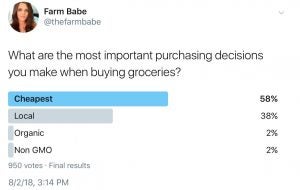I started my blog/social media page about 3.5 years ago after seeing a ton of misinformation online about food and farming. Years ago, before I fell in love with a farmer and became one myself, I was a big-city girl who fell victim to just about every food labeling myth out there. Online movies, articles, animal-activism videos … they all shaped my views on agriculture. What I know now that I didn’t know then was that I was wrong. I didn’t have enough critical thinking back then.
It was before social media became such a pervasive and integrated part of culture. It was before the rise of fake news. It was about a decade ago when it was difficult for us “city folks” to connect with real rural farmers.
Fast forward to today and all that has changed. When I started my blog, “Farm Babe,” it was after reading stuff put out there by the “Food Babe,” who is now famously known as one of the biggest peddlers of fake food and farming news on the internet. There are people out there like her who profit off of fearmongering. Fear sells and they know it, but they have no formal or hands-on training in agriculture or sciences — they’ve never been farmers, they aren’t animal-welfare experts, or farm experts. They have an agenda to sell products.
“Fear” is the new “sex” when it comes to selling a product. Panera Bread famously made a harmless bread additive sound like it was going to kill you by comparing it to fireworks. Food Babe helped get Subway to change an ingredient in their bread by comparing it to a yoga mat.
Is the anti-science movement winning? Four years ago I would’ve said yes. But we are seeing huge consumer shifts. Consumers are fighting back against brands such as Chipotle, Stonyfield, Panera, Triscuit, and Hunt’s. Even the Non-GMO Project was forced to take down the “reviews” section of their Facebook page due to too many one-star reviews. Consumers are catching on — they’re realising a vast majority of labels are not as honest as they seem. The rise in farmers on social media is educating and bridging gap, and we must keep going.
To put this to the test, I created an online poll, and here are the results:

The most important aspect was clearly cost, and only 4 percent of the 950 votes cared about organic and non-GMO. If I could’ve done the survey over again, I would’ve also included quality and taste. The comment section clearly showed that (quality and flavor) as a winner, but the reason I didn’t initially include that as a category as I felt it was common sense. However, maybe that would’ve been another interesting poll and I should do a part 2!
Perhaps flavor and quality have been put to the wayside due to food companies and their marketing? It feels like nowadays you could find a reason to complain about anything in a grocery store. Activist groups, food companies, dieting trends — they’ve all muddied the water of what we should eat. Are we forgetting common sense? The old saying goes, “Kid tested, mother approved,” but now it seems like some food companies act like you’re killing your family if you don’t buy their products. (A popular trend in anti-GMO campaigns).
Do these labeling misconceptions and fearmongering tactics backfire? For people like me, I’d say yes. I used to believe “hormone-free chicken” was something special (there’s no such thing as added hormones in chicken) and pesticide-free organics (organic food can be sprayed with certain pesticides), and when I realized I was duped, I wanted to fire back and get revenge on my wallet. The fact of the matter is that modern agriculture is growing more food on less land while using less natural resources and safer inputs than ever before. Nearly half of the world’s population live on less than $2.50 a day, and Americans spend less on groceries than many other countries. Even more, over the past century, Americans have had to spend a smaller piece of their paychecks on food, thanks to the efficiencies that have been created through innovations and technology in our farm fields.
Modern agriculture in our first-world country is something that should be appreciated and celebrated.
Perhaps if more food companies supported and championed the efficiencies of modern agriculture, stopped confusing people with misleading labels, and just said “thank you” to the farmers who put in the labor daily to feed and clothe the planet, their marketing wouldn’t backfire in so many communities and could actually improve sales. It’s time to listen to us, give thanks, and support science and modern agriculture.
Michelle Miller, the Farm Babe, is an Iowa-based farmer, public speaker, and writer, who lives and works with her boyfriend on their farm, which consists of row crops, beef cattle, and sheep. She believes education is key in bridging the gap between farmers and consumers.



